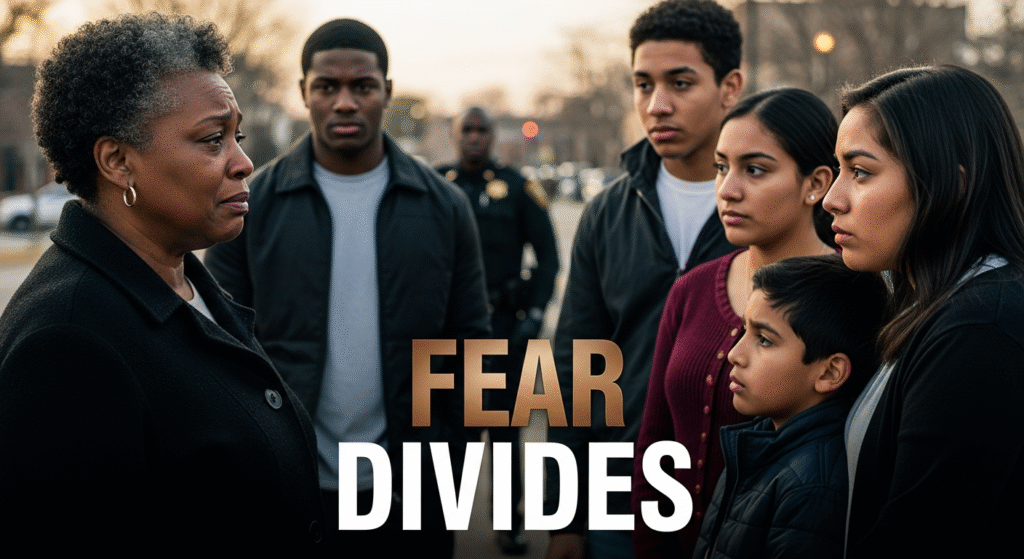

NC Immigration Raids: Black Community Reactions
By Darius Spearman (africanelements)
Support African Elements at patreon.com/africanelements and hear recent news in a single playlist. Additionally, you can gain early access to ad-free video content.
Recent immigration raids across North Carolina have led to hundreds of arrests, sparking a difficult conversation within the Black community. Federal operations in Charlotte and the Triangle area have highlighted a deep divide. While some Black residents support tougher enforcement of immigration laws, many others voice alarm. They see parallels to historical struggles for racial justice, connecting today’s events to long-standing issues of race and policing.
The situation began escalating in mid-November 2025, when a federal surge called “Operation Charlotte’s Web” drew widespread criticism (wfae.org). Reports described masked federal agents in unmarked vehicles conducting arrests in public places, from supermarkets to churches (charlotteobserver.com). Federal officials confirmed over 250 people were detained in the Charlotte area alone (charlotteobserver.com). These actions force a look back at history to understand the complex feelings they generate today.
Echoes of Jim Crow in Modern Racial Profiling
The aggressive tactics used in recent raids resonate deeply within North Carolina’s Black community because of a painful history with law enforcement. For generations, the legal system was a tool of oppression. Jim Crow laws were state and local statutes in the South that enforced racial segregation and discrimination from the late 1800s until the mid-20th century (ncpedia.org). These laws created a “legacy of suspicion” toward police that persists today. This history shapes how many view any form of aggressive policing, including federal immigration enforcement.
Many Black leaders and residents see the current immigration raids through the lens of racial profiling. Racial profiling is the discriminatory practice of targeting individuals for suspicion of a crime based on their race or ethnicity, rather than on their behavior (aclu.org). When North Carolina Governor Josh Stein criticized federal agents for “targeting American citizens based on their skin color,” he gave voice to this fear (wunc.org). Consequently, the issue becomes one of fundamental civil rights, reminding many of an era when skin color alone was enough to justify scrutiny and harassment by authorities.
A History of Fleeing Injustice for Civil Liberties
The Great Migration saw over six million African Americans leave the rural South between 1916 and 1970 (scholars.org). They were fleeing the economic hardship and racial violence of the Jim Crow era (scholars.org). This massive movement was a search for safety, opportunity, and basic civil liberties. Civil liberties are the fundamental individual rights and freedoms, like protection from unreasonable searches, that are guaranteed by the U.S. Constitution (whatisessential.org). The fight to secure these rights has been central to the Black experience in America.
Today, a similar climate of fear is descending upon immigrant communities in North Carolina. This “chilling effect” discourages people from engaging in everyday activities like going to school or reporting crimes for fear of deportation (enlacelatinonc.org). This fear is understandable to a community whose ancestors also fled an unfair legal system. Furthermore, the erosion of civil liberties during immigration raids is a major concern. The ACLU of North Carolina has raised alarms about potential violations of Miranda rights—the right to remain silent and the right to an attorney—during these operations (acluofnorthcarolina.org).
ICE Detentions Surge in North Carolina
ICE detentions in NC increased by up to 170% in early 2025 compared to the same period in 2024 under the previous Biden administration (wunc.org).
The Controversial 287(g) Program
The intersection of local policing and federal immigration law is not new in North Carolina. A key policy has been Section 287(g) of the Immigration and Nationality Act. This is a provision in the primary body of U.S. immigration law that allows the Department of Homeland Security (DHS) to deputize local police to act as federal immigration agents (americanimmigrationcouncil.org). North Carolina saw significant implementation of this program around 2007, with 18 law enforcement agencies joining (southerncoalition.org). From the beginning, civil rights groups warned it would lead to racial profiling.
These warnings proved accurate. The U.S. Department of Justice (DOJ), the federal department responsible for enforcing the law, even sued Alamance County Sheriff Terry Johnson in 2012 for systematically targeting Latino residents (ncdoj.gov). The lawsuit eventually led to a settlement that required independent monitoring and training (unc.edu). However, the program damaged trust between law enforcement and communities of color. Mecklenburg County Sheriff Garry McFadden, a Black Democrat, has refused to cooperate with Immigration and Customs Enforcement (ICE), arguing it makes communities less safe by fostering fear (qnotescarolinas.com).
“Operation Charlotte’s Web” and Community Fear
“Operation Charlotte’s Web” represented a significant escalation of federal enforcement. The operation primarily involved the U.S. Border Patrol, a federal agency usually tasked with patrolling borders but which has authority to operate inside the country (wikipedia.org). Its official goal was to apprehend undocumented immigrants, particularly those with criminal records (wfae.org). An undocumented person is someone who resides in the U.S. without legal authorization (whatisessential.org). However, community reports and arrest data showed that many people without criminal histories were swept up in the raids.
The statistics are striking. Nationwide data from October 2024 to June 2025 shows that 71.7% of ICE detainees had no criminal convictions (ncjustice.org). In one period in North Carolina, nearly half of those arrested had no criminal record (wunc.org). In addition, these aggressive tactics spread fear far beyond those who were arrested. The sight of armed federal agents in residential areas created widespread alarm, leading businesses to close and school attendance to drop (enlacelatinonc.org). This demonstrates how such operations disrupt the entire fabric of a community.
U.S. ICE Detainees by Criminal Conviction Status
From October 2024 to June 2025, nearly 72% of all individuals detained by ICE nationwide had no criminal convictions (ncjustice.org).
A Community Divided: Conflicted Black Responses
The Black community’s response to these raids is not uniform. Many Black leaders have strongly condemned the enforcement actions. They express solidarity with immigrant communities, viewing the issue as part of a shared struggle against systemic racism and unjust policing. The North Carolina Justice Center, for example, argued that using racial profiling harms public safety for everyone (ncjustice.org). For Black immigrants, the situation is even more precarious, as they often face a “double minority status”—discrimination based on both their race and their immigrant status (thenubianmessage.com).
However, some Black residents support stricter immigration enforcement. This perspective can stem from economic anxieties and concerns about competition for jobs, especially in low-wage sectors (niskanencenter.org). After generations of facing economic marginalization, some may feel that stricter controls are necessary to protect their opportunities. In addition, there is a belief among some that all people should follow established legal pathways to immigration, reflecting a commitment to the rule of law. These varied viewpoints highlight the complex internal dialogue happening within the Black community.
The Path Forward: Community Trust and Solidarity
The current immigration policies are having a complex effect on Black-Latino relations. On one hand, shared experiences with racial profiling can build powerful coalitions. Civil rights groups and immigrant advocacy organizations often work together to fight discriminatory practices (southerncoalition.org). On the other hand, perceived competition for scarce economic resources can sometimes create friction between the communities. The long-term impact will depend on whether shared struggles can overcome these potential divisions.
Ultimately, the central issue is the erosion of community trust in law enforcement. When any group fears the police, public safety for all is compromised. The debate in North Carolina’s Black community reflects a larger national challenge. It is the challenge of enforcing laws without sacrificing the civil rights and trust that are fundamental to a just society. Consequently, how North Carolina navigates this crossroads will have lasting implications for racial justice and community relations for years to come.
About the Author
Darius Spearman is a professor of Black Studies at San Diego City College, where he has been teaching for over 20 years. He is the founder of African Elements, a media platform dedicated to providing educational resources on the history and culture of the African diaspora. Through his work, Spearman aims to empower and educate by bringing historical context to contemporary issues affecting the Black community.
